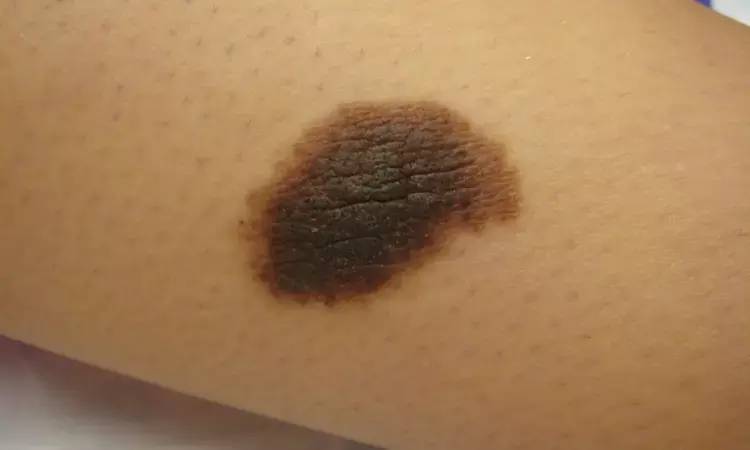- Home
- Medical news & Guidelines
- Anesthesiology
- Cardiology and CTVS
- Critical Care
- Dentistry
- Dermatology
- Diabetes and Endocrinology
- ENT
- Gastroenterology
- Medicine
- Nephrology
- Neurology
- Obstretics-Gynaecology
- Oncology
- Ophthalmology
- Orthopaedics
- Pediatrics-Neonatology
- Psychiatry
- Pulmonology
- Radiology
- Surgery
- Urology
- Laboratory Medicine
- Diet
- Nursing
- Paramedical
- Physiotherapy
- Health news
- Fact Check
- Bone Health Fact Check
- Brain Health Fact Check
- Cancer Related Fact Check
- Child Care Fact Check
- Dental and oral health fact check
- Diabetes and metabolic health fact check
- Diet and Nutrition Fact Check
- Eye and ENT Care Fact Check
- Fitness fact check
- Gut health fact check
- Heart health fact check
- Kidney health fact check
- Medical education fact check
- Men's health fact check
- Respiratory fact check
- Skin and hair care fact check
- Vaccine and Immunization fact check
- Women's health fact check
- AYUSH
- State News
- Andaman and Nicobar Islands
- Andhra Pradesh
- Arunachal Pradesh
- Assam
- Bihar
- Chandigarh
- Chattisgarh
- Dadra and Nagar Haveli
- Daman and Diu
- Delhi
- Goa
- Gujarat
- Haryana
- Himachal Pradesh
- Jammu & Kashmir
- Jharkhand
- Karnataka
- Kerala
- Ladakh
- Lakshadweep
- Madhya Pradesh
- Maharashtra
- Manipur
- Meghalaya
- Mizoram
- Nagaland
- Odisha
- Puducherry
- Punjab
- Rajasthan
- Sikkim
- Tamil Nadu
- Telangana
- Tripura
- Uttar Pradesh
- Uttrakhand
- West Bengal
- Medical Education
- Industry
Study emphasizes vitamin D supplementation for all congenital melanocytic nevi patients during the winter months

UK: A recent study published in Pediatric Dermatology supports routine vitamin D supplementation for all congenital melanocytic nevi (CMN) patients, without routine serum measurement.
The study demonstrates that children in the UK with CMN have a high prevalence of vitamin D deficiency and insufficiency, but this prevalence is similar to that observed in general European populations. Current UK NICE (National Institute of Clinical Excellence) guidelines suggest that deficiency should be treated with high-dose Vitamin D followed by daily maintenance, while all individuals (adults and children) should consider taking 10 micrograms of Vitamin D maintenance daily.
NICE also stresses that children at risk, including those who wear clothes with little skin exposure, which likely includes many patients with CMN, take 10 micrograms of Vitamin D throughout the year.
Congenital melanocytic nevi are rare, pigmented birthmarks that can predispose patients to melanoma of the central nervous system and skin. Data from non-CMN melanoma cohorts indicates that vitamin D levels may be connected to outcome, prompting this study of 25-hydroxyvitamin D levels in plasma samples from 40 children with CMN.
"While 27% were insufficient and 13% deficient, this was representative of European populations, and UK supplementation guidelines are already in place," Veronica A. Kinsler, Great Ormond Street Hospital for Children NHS Foundation Trust, London, UK, and colleagues wrote in their study.
The researchers measured 25-hydroxyvitamin D from stored plasma samples from 40 children with CMN with informed written consent under the approval of the research ethics committee. Data collection was done between 2007 and 2020, spread throughout the years for an unconnected study.
The mean and median ages of the cohort were 8.4 years and 7.9 years, respectively. None of the patients were taking vitamin D supplementation at the time of sampling. Plasma samples were measured by mass spectrometry assay.
The study led to the following findings:
· Mean and median 25-hydroxy Vitamin D were 63.0 nmol/L and 57.0 nmol/L respectively.
· Twenty-seven per cent of levels were deemed insufficient (30–49 nmol/L), and 13% deficient (<30 nmol/L) by age-matched UK standards used in the hospital diagnostic laboratory.
· Multiple linear regression in this cohort demonstrated that total vitamin D levels were not statistically significantly influenced by age, sex, CMN projected adult size (PAS), or season in which the sample was taken, however, due to the relatively restricted sample size these analyses may be underpowered.
One of the study limitations was the lack of data on photoprotection practices of the cohort, and the relatively severe phenotypic spectrum. Therefore, these recommendations would not necessarily apply to children with a single small CMN, the researchers note.
"These recommendations and data suggest that children with CMN take daily 10 μg (400 IU) supplements at least during the winter months (from late September until early April)," the researchers wrote, adding that, "this is the standard evidence-based guideline from the National Health Service (NHS) for vitamin D supplementation for the general population of adults and children over five years old in the UK."
"Given these pre-existing guidelines and the lack of difference between levels in our patient population and the normal population, actual measurement of serum vitamin D is not merited in CMN patients," they concluded.
Reference:
Hughes, C. T., Dadhra, J., Polubothu, S., & Kinsler, V. A. (2023). Vitamin D status in children with congenital melanocytic nevi. Pediatric Dermatology, 41(1), 58-60. https://doi.org/10.1111/pde.15462
Dr Kamal Kant Kohli-MBBS, DTCD- a chest specialist with more than 30 years of practice and a flair for writing clinical articles, Dr Kamal Kant Kohli joined Medical Dialogues as a Chief Editor of Medical News. Besides writing articles, as an editor, he proofreads and verifies all the medical content published on Medical Dialogues including those coming from journals, studies,medical conferences,guidelines etc. Email: drkohli@medicaldialogues.in. Contact no. 011-43720751


